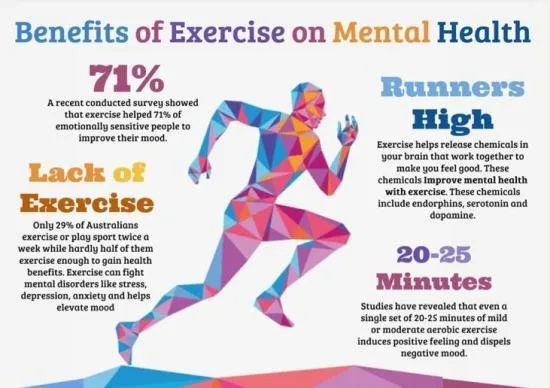7 Tips to Boost Your Mental Health Through Exercise
Mental health and exercise play crucial roles in our overall well-being, encompassing our emotional, psychological, social, and physical health. They influence how we think, feel, and act, impacting our relationships, work, and daily functioning. Prioritizing mental health is essential, as it can lead to improved coping skills, greater resilience, and enhanced productivity. One effective way to support mental health is through regular physical activity.
The Connection Between Exercise and Mental Well-Being

The relationship between exercise and mental health is well-documented. When we engage in physical activity, our bodies release a variety of hormones, including endorphins, which are often referred to as “feel-good” hormones. These endorphins create a sense of happiness and euphoria, helping to alleviate feelings of anxiety and depression. Furthermore, exercise has been shown to improve sleep quality, increase energy levels, and boost self-esteem—all of which contribute positively to mental health.
Incorporating exercise into your daily routine can be a transformative experience, but it can also feel overwhelming at first. Many people struggle to find the motivation to start or maintain a consistent exercise routine, particularly in times of stress or uncertainty. However, developing a sustainable approach to exercise doesn’t have to be complicated. By integrating movement into your life in enjoyable and manageable ways, you can create a positive feedback loop that enhances your mental well-being.
In this article, we will explore seven practical tips for incorporating exercise into your mental health routine. Each tip is designed to help you cultivate a healthier lifestyle while reaping the numerous psychological benefits that physical activity offers. From setting realistic goals to discovering activities you enjoy, these strategies can make exercise a fulfilling and integral part of your life. Let’s delve into these actionable tips that can lead you toward improved mental health and well-being.
-
Start Small and Set Realistic Goals
Begin with manageable activities to build a sustainable exercise habit. Setting small, achievable goals allows you to celebrate your progress and gradually increase the intensity or duration of your workouts. For example, aim for just 10-15 minutes of activity a day, such as a brisk walk, and increase it as you feel more comfortable. This approach can boost your confidence and motivation, leading to improved mental well-being.
-
Choose Activities You Enjoy
Finding joy in your workouts is crucial for long-term adherence. Engage in exercises that genuinely excite you, whether it’s dancing, swimming, hiking, or cycling. When you enjoy your workouts, they become less of a chore and more of a fulfilling experience. This positive association can enhance your mood and contribute to a more positive outlook on life. For pregnant women, it’s equally important to find enjoyable activities that are safe and beneficial. Light exercises such as prenatal yoga, walking, or swimming can be wonderful options.
-
Establish a Routine
Consistency is key to reaping the mental health benefits of exercise. Set aside specific times each week for physical activity, treating your workouts as important appointments. Establishing a routine helps make exercise a regular part of your life, which can create a sense of stability and predictability, both of which are beneficial for mental health.
-
Mix It Up
Variety keeps your exercise routine fresh and engaging. Alternate between different types of workouts, such as cardio, strength training, and flexibility exercises. This not only prevents boredom but also challenges your body in new ways. Engaging in diverse activities can increase your motivation and enjoyment, further enhancing your mental well-being.
-
Incorporate Mind-Body Practices
Mind-body exercises, such as yoga and meditation, can complement your physical routine and promote mental clarity. These practices foster relaxation and help alleviate anxiety and stress. By incorporating a short meditation session or gentle yoga practice into your weekly schedule, you can enhance your emotional resilience and improve your overall mental health.
-
Exercise with Others
Working out with friends or family can provide motivation, accountability, and social interaction. Joining a fitness class, walking group, or sports team fosters a sense of community and can significantly boost your mood. The shared experience of exercising with others can help alleviate feelings of loneliness and enhance your overall well-being.
-
Listen to Your Body
Pay attention to how your body feels during and after exercise. It’s essential to practice self-compassion and adjust your routine based on your energy levels and physical state. If you experience fatigue or discomfort, allow yourself to rest or modify your activities. Prioritizing your well-being ensures that exercise enhances your mental health rather than detracting from it.

Conclusion
Incorporating exercise into your daily life is a powerful way to boost your mental health. By following these tips, you can create a balanced approach to physical activity that enhances your overall well-being. Remember, it’s about finding what works for you and making movement a joyful part of your routine. Prioritize your mental health today by embracing the positive impact of exercise.

